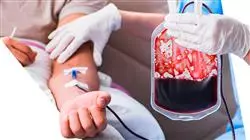University certificate
The world's largest faculty of medicine”
Introduction to the Program
A 6-month 100% online academic experience with the most advanced syllabus in MDS, Myeloproliferative Neoplasms and CLL”

In recent years there has been an important evolution in the field of oncohematology as a result of the of Oncohematology as a result of continuous work in the scientific field. A work that has that has made it possible to understand the etiology of myelodysplastic syndromes and to develop new drugs according to the risk and progression of the disease.
A scenario that leads medical professionals to be in a continuous updating of their knowledge in both diagnostic and therapeutic procedures. In this line, TECH has decided to create this Postgraduate diploma of 6 months of duration with the most advanced syllabus, elaborated by real specialists in this area.
It is a program with a theoretical-practical approach that will allow the graduate to be up to date in the management of low and high risk MDS, the results with hypomethylating agents and with HSCT, as well as Chronic Lymphocytic Leukemia with the advantages and disadvantages of the different therapeutic alternatives. In addition, thanks to the multimedia pills and the numerous pedagogical material, the graduate will delve into Myeloproliferative Neoplasms and their difficult differential diagnosis.
Likewise, the Relearning method will lead the professional to consolidate the most important concepts in a simple way, reducing concepts in a simple way, thus reducing the long hours of study and memorization of study and memorization.
Thus, the physician is faced with a first class academic experience that adapts to their needs for updating and their daily activities. And the fact is that, without the need to attend centers in person, or have classes with fixed schedules, the graduate will be able to better self-manage access to this university program.
A university degree adapted to your needs. Flexible and with content easily accessible from your digital device with internet connection”
This Postgraduate diploma in Myelodysplastic Syndromes and Chronic Leukemia contains the most complete and up-to-date scientific program on the market. The most important features include:
- The development of practical cases presented by experts in Hematology and Hemotherapy
- The graphic, schematic, and practical contents which provide scientific and practical information on the disciplines that are essential for professional practice
- Practical exercises where the self-assessment process can be carried out to improve learning
- Its special emphasis on innovative methodologies
- Theoretical lessons, questions to the expert, debate forums on controversial topics, and individual reflection work
- Content that is accessible from any fixed or portable device with an Internet connection
Delve whenever you wish into the latest therapeutic advances in Myeloproliferative Neoplasms through the syllabus prepared by distinguished specialists in Oncohematology”
The program's teaching staff includes professionals from the sector who bring to this program the experience of their work, in addition to recognized specialists from prestigious reference societies and universities.
The multimedia content, developed with the latest educational technology, will provide professionals with situated and contextual learning, i.e., a simulated environment that will provide immersive training, designed for training oneself in real situations.
The design of this program focuses on Problem-Based Learning, by means of which the professional must try to solve the different professional practice situations that are presented throughout the academic course. For this , purpose students will be assisted by an innovative interactive video system developed by renowned experts.
With this university degree you will be aware of the clinical development of promising new drugs for high-risk MDS”

The multiple didactic resources of this degree will facilitate your update in Myelodysplastic Syndromes and Chronic Leukemia”
Why study at TECH?
TECH is the world’s largest online university. With an impressive catalog of more than 14,000 university programs available in 11 languages, it is positioned as a leader in employability, with a 99% job placement rate. In addition, it relies on an enormous faculty of more than 6,000 professors of the highest international renown.

Study at the world's largest online university and guarantee your professional success. The future starts at TECH”
The world’s best online university according to FORBES
The prestigious Forbes magazine, specialized in business and finance, has highlighted TECH as “the world's best online university” This is what they have recently stated in an article in their digital edition in which they echo the success story of this institution, “thanks to the academic offer it provides, the selection of its teaching staff, and an innovative learning method aimed at educating the professionals of the future”
A revolutionary study method, a cutting-edge faculty and a practical focus: the key to TECH's success.
The most complete study plans on the university scene
TECH offers the most complete study plans on the university scene, with syllabuses that cover fundamental concepts and, at the same time, the main scientific advances in their specific scientific areas. In addition, these programs are continuously being updated to guarantee students the academic vanguard and the most in-demand professional skills. In this way, the university's qualifications provide its graduates with a significant advantage to propel their careers to success.
TECH offers the most comprehensive and intensive study plans on the current university scene.
A world-class teaching staff
TECH's teaching staff is made up of more than 6,000 professors with the highest international recognition. Professors, researchers and top executives of multinational companies, including Isaiah Covington, performance coach of the Boston Celtics; Magda Romanska, principal investigator at Harvard MetaLAB; Ignacio Wistumba, chairman of the department of translational molecular pathology at MD Anderson Cancer Center; and D.W. Pine, creative director of TIME magazine, among others.
Internationally renowned experts, specialized in different branches of Health, Technology, Communication and Business, form part of the TECH faculty.
A unique learning method
TECH is the first university to use Relearning in all its programs. It is the best online learning methodology, accredited with international teaching quality certifications, provided by prestigious educational agencies. In addition, this disruptive educational model is complemented with the “Case Method”, thereby setting up a unique online teaching strategy. Innovative teaching resources are also implemented, including detailed videos, infographics and interactive summaries.
TECH combines Relearning and the Case Method in all its university programs to guarantee excellent theoretical and practical learning, studying whenever and wherever you want.
The world's largest online university
TECH is the world’s largest online university. We are the largest educational institution, with the best and widest online educational catalog, one hundred percent online and covering the vast majority of areas of knowledge. We offer a large selection of our own degrees and accredited online undergraduate and postgraduate degrees. In total, more than 14,000 university degrees, in eleven different languages, make us the largest educational largest in the world.
TECH has the world's most extensive catalog of academic and official programs, available in more than 11 languages.
Google Premier Partner
The American technology giant has awarded TECH the Google Google Premier Partner badge. This award, which is only available to 3% of the world's companies, highlights the efficient, flexible and tailored experience that this university provides to students. The recognition as a Google Premier Partner not only accredits the maximum rigor, performance and investment in TECH's digital infrastructures, but also places this university as one of the world's leading technology companies.
Google has positioned TECH in the top 3% of the world's most important technology companies by awarding it its Google Premier Partner badge.
The official online university of the NBA
TECH is the official online university of the NBA. Thanks to our agreement with the biggest league in basketball, we offer our students exclusive university programs, as well as a wide variety of educational resources focused on the business of the league and other areas of the sports industry. Each program is made up of a uniquely designed syllabus and features exceptional guest hosts: professionals with a distinguished sports background who will offer their expertise on the most relevant topics.
TECH has been selected by the NBA, the world's top basketball league, as its official online university.
The top-rated university by its students
Students have positioned TECH as the world's top-rated university on the main review websites, with a highest rating of 4.9 out of 5, obtained from more than 1,000 reviews. These results consolidate TECH as the benchmark university institution at an international level, reflecting the excellence and positive impact of its educational model.” reflecting the excellence and positive impact of its educational model.”
TECH is the world’s top-rated university by its students.
Leaders in employability
TECH has managed to become the leading university in employability. 99% of its students obtain jobs in the academic field they have studied, within one year of completing any of the university's programs. A similar number achieve immediate career enhancement. All this thanks to a study methodology that bases its effectiveness on the acquisition of practical skills, which are absolutely necessary for professional development.
99% of TECH graduates find a job within a year of completing their studies.
Postgraduate Diploma in Myelodysplastic Syndromes and Chronic Leukemia
Myelodysplastic syndromes and chronic leukemia are complex hematological diseases that affect a large number of people worldwide. If you are interested in learning more about these diseases and how to treat them, TECH Global University of Technology presents the Postgraduate Diploma in Myelodysplastic Syndromes and Chronic Leukemia. This specialized education program will address the different subtypes of myelodysplastic syndromes and chronic leukemia and how to identify them. You will also learn about diagnostic testing, including laboratory testing and bone marrow biopsy.
Experts in these diseases have the knowledge and skills necessary to effectively address these diseases, which can improve patients' quality of life and survival. By pursuing the postgraduate degree offered by TECH they will learn the different treatment options available for these diseases, including chemotherapy, biological therapy and bone marrow transplants. Important topics such as the management of treatment side effects and pain management will also be addressed. In addition to, providing the flexibility to study at your own pace from anywhere with internet access, allowing you to study from anywhere at any time. Take advantage of this great opportunity and take your career to the next level at the hand of TECH!







